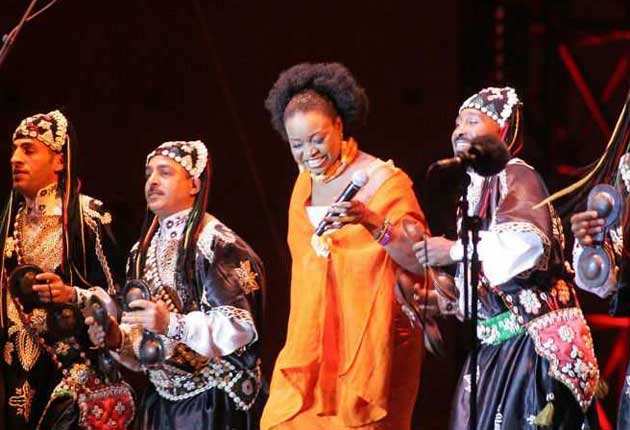Oumou Sangare, Barbican Hall, London

Your support helps us to tell the story
From reproductive rights to climate change to Big Tech, The Independent is on the ground when the story is developing. Whether it's investigating the financials of Elon Musk's pro-Trump PAC or producing our latest documentary, 'The A Word', which shines a light on the American women fighting for reproductive rights, we know how important it is to parse out the facts from the messaging.
At such a critical moment in US history, we need reporters on the ground. Your donation allows us to keep sending journalists to speak to both sides of the story.
The Independent is trusted by Americans across the entire political spectrum. And unlike many other quality news outlets, we choose not to lock Americans out of our reporting and analysis with paywalls. We believe quality journalism should be available to everyone, paid for by those who can afford it.
Your support makes all the difference.When the Wassoulou singer Oumou Sangare tours at home in Mali, West Africa, she comes with her own praise singer who travels ahead to announce her coming – think a prettier version of modern-day spin doctoring, but for a self-made African singing legend.
At the Barbican, the kamele ngoni player Brehima Diakate and the excellent young dancers-cum-backing singers Dandio Sidibe and Fatoumata Diawara announce her imminent arrival with a rousing arpeggio and chorus vocals on the opening "Kayini Wura", with Sangare herself exploding into full, extraordinary voice from the wings before she's even hit the stage.
Since bursting onto her country's music scene at the age of twenty with the release of Moussoulou ("Women"), Sangare has established herself as a leonine African voice. Her music, which has since exploded onto the world stage, is embedded in the tribal legacy and songs of the Wassoulou, who live south of the Niger river. Her mother taught her these traditions; her father's desertion of the family when she was an infant taught her something else – independence, and a resolve to be dominated by no one, least of all a man.
This rare appearance was eagerly anticipated, and by and large, she delivered, though at the beginning her ten-strong band kicked into the kind of stadium dynamics that conspired to flatten out the drama of her music.
But by the third number, "Koroko", the ensemble sound had settled more comfortably, the guitarist Hamane Toure delivering superbly soulful rhythm guitar lines and engaging in a polyphonic dialogue with the percussion players on "Senkele Te Sira", with the flute of Amadou Traore floating in as if from some rare grooves session.
The most effective part of the concert saw the band slimmed to an acoustic seven-piece, all nuance and fine melodic touches as Sangare took us through "Donso" and the Gnawa-like rhythms of "Kounadya". Hers is a voice as big as a house, an indomitable force packed with raw ingredients – sweet, sour, bitter, succulent and hot.
"Are you ready to dance?" she asks before the closing "Seya", which sees much of the Barbican's stalls filling the aisles, and even the stage, as a group of African girls who'd apparently arrived without even a ticket, find themselves up there with the star as the band locks down on a final, ebullient pulse.
Join our commenting forum
Join thought-provoking conversations, follow other Independent readers and see their replies
Comments